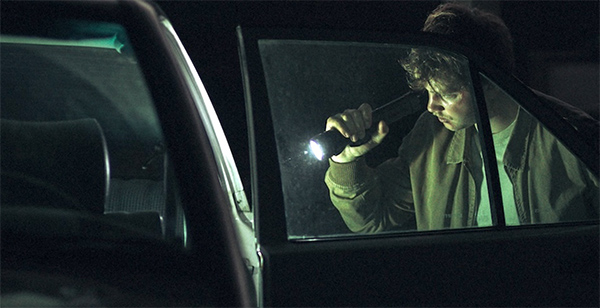Investigation of a Citizen Under Suspicion: Du Welz Revisits Bungled Belgian Murder Case
 “It is grand to contemplate the ruins of cities; but it is grander still to contemplate the ruins of human beings!,’ wrote Comte de Lautreamont, aka Isidore Lucien Ducasse, the French poet famed for his Surrealist poetic novel Les Chants de Maldoror. It’s perhaps one of the less sensational or bizarre phrases from Lautreamont, the menacing essence of his iconic protagonist hanging like a slinky subtextual shadow over Maldoror, the latest narrative film from Belgium’s foremost arthouse genre auteur, Fabrice du Welz. But it’s the sentiment at the heart of his latest film, which most certainly deals with human ruination.
“It is grand to contemplate the ruins of cities; but it is grander still to contemplate the ruins of human beings!,’ wrote Comte de Lautreamont, aka Isidore Lucien Ducasse, the French poet famed for his Surrealist poetic novel Les Chants de Maldoror. It’s perhaps one of the less sensational or bizarre phrases from Lautreamont, the menacing essence of his iconic protagonist hanging like a slinky subtextual shadow over Maldoror, the latest narrative film from Belgium’s foremost arthouse genre auteur, Fabrice du Welz. But it’s the sentiment at the heart of his latest film, which most certainly deals with human ruination.
Having long been interested in the dark desires dictating human behavior, notably taking on the Honeymoon Killers for Alleluia (2014), the second part of his formidable Ardennes trilogy, he next revisits an infamous judicial scandal from the mid 1990s, where a pedophile and murderer was allowed to persist due to a multijurisdictional stalemate amongst three Belgian law enforcement entities. Surprisingly, du Welz takes the approach of a procedural, focusing on a hot-headed rookie who becomes obsessed with cracking the case. Anthony Bajon headlines from a perspective of the self-righteous, which serves as an intriguing change of pace for a director who tends to focus on characters consumed by dangerous compulsions. Arguably, it would seem, the road to personal ruination looks the same from either side of the law.
Belgium, 1995. With looming law enforcement reform, the three police departments, consisting of the Gendarmerie, the Local Police, and the Judicial Police, engage in a communicative cold war. When two young girls disappear, the investigation hemorrhages, leading the local community to band together in a grassroots effort to intervene. Police recruit Paul Chartier (Bajon), a hothead whose passion for his profession also belies a need to distance himself from a troubled past, receives a tip from a local unreliable source which alerts him of Marc Dutroux (Sergi López), who had previously been convicted for raping young girls in 1989. Dutroux is rumored to have been constructing a secret basement, but the interdepartmental red tape doesn’t allow the Gendarmerie to secure the proper search warrant. As the investigation slowly lurches forward, Paul marries into a proud Italian family, and eventually has a child with his wife (Alba Gaïa Bellugi). However, when the case finally breaks, Chartier is blamed for bungling the case, leading him to spiral out of control.

Du Welz reunites with a number of his regular contributors in front of and behind the camera. Screenwriter Domenico La Porta, who worked on revisions for Inexorable (2021), leans into familiar tropes of tenacious cops who compromise their lives and careers while struggling to navigate a bureaucratic nightmare hampering a high profile investigation. With its retro approach and multijurisdictional angle, the narrative feels comparable to John Lee Hancock’s The Little Things, set in 1990s Los Angeles, where an obvious suspect is able to slip through the cracks, leading a detective to take matters into his own hands.
Bajon, who first rose to acclaim in Cedic Kahn’s The Prayer (2018), takes center stage as unpredictable but talented recruit Paul Chartier, a young man with a photographic memory who seems to have a natural instinct for his occupation. He also happens to be one of du Welz’s least compelling protagonists across a body of work speckled with psychotic women, such as Emmanuelle Beart in Vinyan (2008), Lola Duenas in Alleluia (2014) and Alba Gaia Bellugi in Inexorable, the latter on hand as the inevitably ignored new wife of Chartier.
Extravagant femme elements exist in the peripheral subplots of Maldoror, namely Béatrice Dalle (herself the subject of a 2024 Pasolini inspired travelogue directed by du Welz in The Passion According to Beatrice) as Chartier’s alcoholic mother. Also, though much less utilized is Lubna Azabal as a criminal kingpin from Charter’s complicated past (whose son, played by Félix Maritaud, has little to do). Sergei Lopez feels appropriately cast as Marc Dutroux, a frumpy creep whose guilt is never in doubt.
More colorful is du Welz regular Laurent Lucas as a gunshy police captain whose butchered face serves as a constant reminder for the price of heroism. DP Manu Dacosse, who’s also worked for du Welz several times in the past, once again proves to be a dependable visual force in brooding genre elements, which is usually most evident whenever the frame breaks away from Bajon’s agitated energy.
What’s most curious is how the film’s title suggests a dark surrealism rather than the grimy, matter-of-fact procedural Maldoror ends up being. Of course, much like Lautreamont’s text collapses the narrator and protagonist to create unreliability, Chartier’s actions lead to a loss of control into vigilantism, wherein he also becomes a criminal in his dogged pursuit of justice, which represents a personal reflection of his abilities. Perhaps a bit more mainstream than might be expected from the distinctive human miseries usually employed by du Welz, Maldoror is an enjoyably meaty recuperation of an infamous scandal.
Reviewed on September 3rd at the 2024 Venice Film Festival (81st edition) – Out of Competition section. 155 Minutes.
★★★/☆☆☆☆☆


